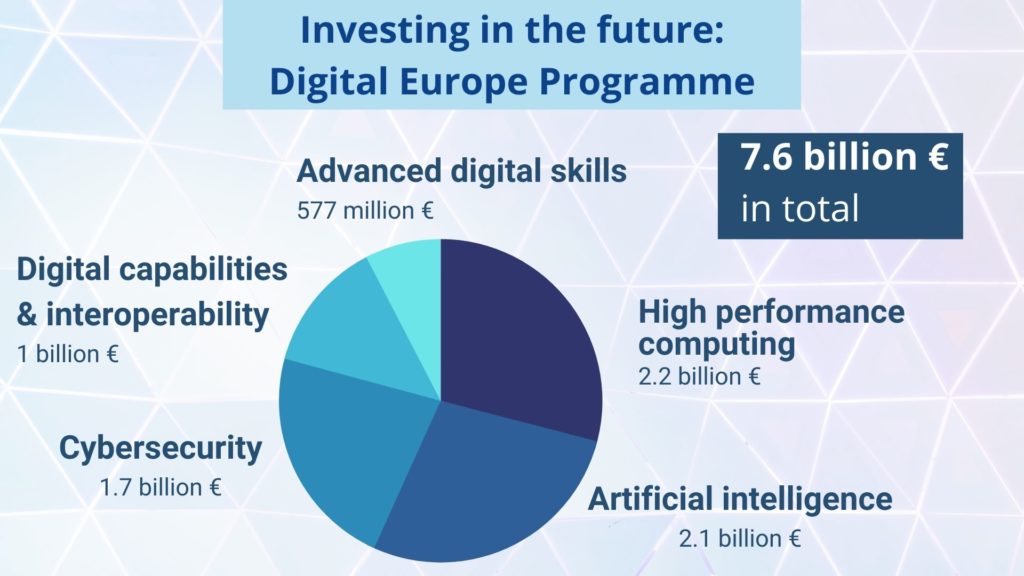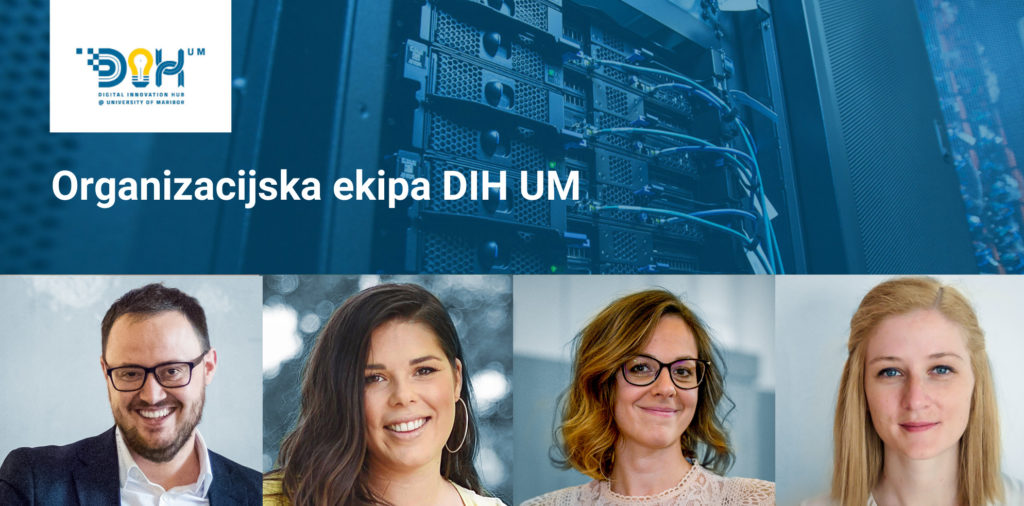19/7/2021
Digitization and related technologies are increasingly shaping our lives. They are changing the way we work, shop, communicate and spend our free time. With the role of technology in our daily lives, the integration of these into the economy and public administration is becoming increasingly important for the entire country. In business circles, more and more industrial companies are turning to the concept of Industry 4.0 and service companies to the digital transformation. The central idea of digital transformation is to change business processes in organizations in such a way that they are as much as possible supported and automated with the help of digital technologies. The need to promote the digital and technological transformation of the economy became even clearer during the COVID-19 pandemic.
Many companies in Slovenia have already started digitalizing their operations, but the number is still too low. According to the DESI (Digital Economy and Society Index), Slovenia is below the average of the European Union (EU) in 16th place, and has even fallen behind in recent years. Of the four areas assessed by DESI, Slovenia performed even worse in the use of Internet services, followed by the integration of digital technologies.
For the EU, the share of global GDP is projected to decline from the current 22% to 14% by 2050, so the importance of the digital transformation of the economy is also reflected in the EU strategy. The EU does not want to become just a market for foreign companies, especially for the fast-growing Asian market for various digital service providers. Accordingly, the EU has decided to halt the negative trend and adjust the course in its favor, in particular through innovation and digital transformation. Thus, in addition to topics related to the creation of a green society, digitalisation is also highlighted as one of the most important challenges of current generations. How we tackle these challenges will undoubtedly affect our future. Accordingly, in the field of digitalisation, the European Commission has set up the Digital Europe Program (DEP), which will be implemented between 2021 and 2027 and will promote the digital transformation of European society. The EU will provide as much as € 9.2 billion under the long-term budget for this period and will be a complementary funding program to Horizon Europe.
Within the framework of the DEP, the European Commission also envisaged the establishment of European Digital Innovation Hubs (EDIH). EDIH will play a key role in the DEP in promoting the digital transformation of the economy and the public sector, focusing on introducing new approaches, processes and processes using advanced technologies such as artificial intelligence, supercomputing (HPC) and supporting cyber security and other digital technologies. It also aims to support companies in experimenting and testing advanced digital solutions (especially in Industry 4.0 and 5.0), learning about the possibility of collaborating with researchers, other regional companies, learning about good practices from Europe, upgrading knowledge and competencies or obtaining advice on digital transformations. In light of this, the Digital Innovation Hub of the University of Maribor (DIH UM), which is also the coordinator of the DIGI-SI consortium, one of the three national candidates vying for the EDIH title, seeks to achieve the aforementioned challenges and goals.

Digitization and DIH UM
DIH UM, established by the Rector’s Board on 21 January 2019, has been operating as a comprehensive operational digital innovation hub for two years, connecting researchers and their knowledge, research equipment and solutions with local, national and international partners from business and public administration. It is being developed under the tutelage of doc. dr. Muhamed Turkanović, who is regularly employed at the Institute of Informatics of the Faculty of Electrical Engineering, Computer Science and Informatics, University of Maribor.
Through its activities, DIH UM wants to contribute to the implementation and wider use of technologies of artificial intelligence, super-computing (HPC), cyber security and other digital technologies in the economy. It focuses in particular on the needs of micro, small and medium-sized enterprises (SMEs) and public sector organizations. To achieve these goals, DIH UM actively builds an ecosystem in which it encourages cooperation between companies, academia and other support institutions of the Eastern Cohesion Region of Slovenia, which lags behind the Western Cohesion Region in terms of economic results and is one of the less developed areas.
DIH UM operates on the principle of openness to all stakeholders. It operates vertically in the priority areas of the Smart Specialization Strategy of Slovenia, and horizontally in the technological areas in accordance with the policy of Digital Europe. It is a single entry point for the Eastern Cohesion Region and helps the economy identify suitable partners who can help them in the digital transformation process.
As already mentioned, DIH UM is also the coordinator of the DIGI-SI consortium, one of the three national candidates for EDIH. The proposals of the candidates were submitted by the Ministry of Public Administration to the European Commission, which will decide on the award of the EDIH title in the second round of the tender. The consortium at DIH UM also includes Arctur d.o.o., Jožef Stefan Institute, ITC Murska Sobota, Technology Park Ljubljana and the Digital Innovation Hub of Slovenia. Although the partners are active in a variety of sectors from agriculture to healthcare, artificial intelligence technology with a focus on supercomputing (HPC) and cyber security serves as a common thread that unites the activities of all members of the consortium.
DIH UM services
DIH UM is based on four pillars or. provides four sets of services: “Skills and Training”, “Pre-Investment Testing”, “Innovation Ecosystem and Networking” and “Investor Search Support”. The first set of activities focuses mainly on upgrading digital competencies, organizing workshops and conducting training in the field of digitalization, and promoting, creating and disseminating these skills in business and public administration. In this area, DIH UM also creates new opportunities for the transfer of knowledge from academic circles to the wider business environment. The implementation of workshops and trainings in the field of digitalization offers an excellent opportunity to promote the extensive professional and practical knowledge of UM researchers.
The second set of services, ie “Pre-investment testing”, allows companies and organizations to test and test digitization technologies and approaches before they are forced to actually invest in them. Services in this area also include digital maturity assessment, digital transformation planning, promoting digital integration, testing and experimenting with digital technologies (software and hardware), promoting development and research projects and contract research, etc. Particular emphasis will be placed on key technologies promoted by DEP, ie, HPC, artificial intelligence and cyber security.
DIH UM offers companies assistance in finding suitable researchers and infrastructure for the implementation of joint research and development projects. The third set of services, which focuses on community building and building trust between stakeholders, is also important. Professional associations and other informal networks in which DIH UM is involved, including foreign EDIHs, primarily serve to form new and nurture existing business partnerships.
DIH UM’s networking and promotional events are intended for just that – creating connections and building relationships between stakeholders. In addition to connecting with potential project partners, the events also offer the opportunity to present the inventions and innovations of researchers to potential customers and interested companies. DIH UM also promotes the knowledge of researchers on social networks and its web portal (http://dih.um.si). On the DIH UM web portal, researchers can edit their profiles themselves and list the knowledge and projects they would like to highlight and present to companies at home and abroad. The portal also includes a presentation of UM infrastructure that can be used to support digitization, a presentation of implemented projects of UM researchers related to digitization, etc.
Despite the fact that DIH UM is currently focused primarily on the regional level, part of the mission is also to contribute axis for closer cooperation at European level. The “Investor Search” section refers to opportunities and the search for various forms of support and investment in national and international networks, such as the Enterprise Europe Network and InvestEU. DIH UM organizes joint projects, workshops and conferences with other DIHs, which offer opportunities for building new and upgrading existing connections. As part of the DIGI-SI nomination for EDIH, the range of opportunities for stakeholders at European level will increase.

Cooperation with DIH UM
Within DIH UM, there is an organizational team of professional associates who actively build an integrated ecosystem and take care of the promotion of knowledge, equipment and technologies of the University of Maribor and beyond. An expert team of 120+ different researchers from 47 research groups from all 17 faculties of UM member states, whose field of research touches on digitalisation, is also actively involved. We also invite researchers who have not yet contacted us, but have identified the opportunities that await us in the context of Digital Europe in the next EU financial perspective. We will do our best to promote your knowledge, existing technologies and your research in the field of digitalisation at home and abroad as effectively as possible.



